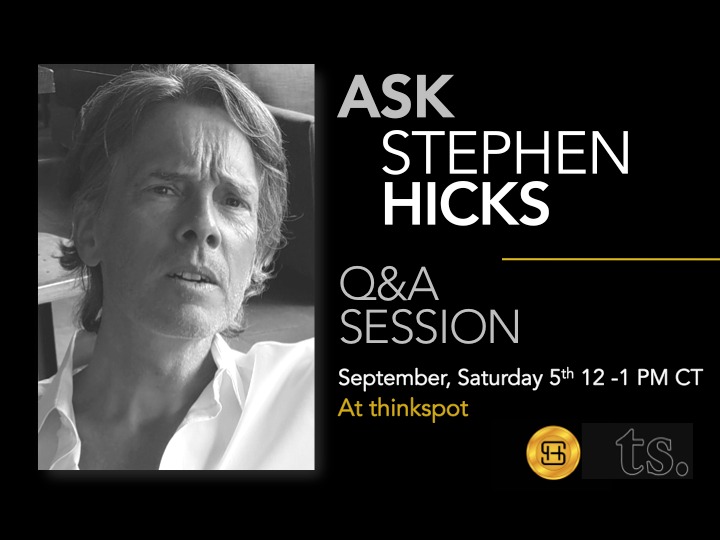Saturday at noon Central. Sign up here: https://thinkspot.com/event_signup?event=MJuLoQ.
Questions posted so far:
SLAVERY
1. [T]he current reparations demands from more organized BLM representatives: what are your thoughts on the current reparations debate? Do you foresee radical forms or lesser forms of it manifesting in policy? Are you in agreement with certain forms of it? Do you feel the point of guilt/pride disassociation above is enough to deter more radical demands of reparations or reparations more generally if this in practice is immoral and antithetical to liberalism’s tenets? AlexMedina
PHILOSOPHERS
2. [Follow-up to Rand on Nietzsche:] How much was Marx influenced by Hegel?
CULTURE
3. Do you see a link between rising affluence and a decline in the injunction of ‘Love thy neighbor as thyself’?
4. Are there different “kinds” of institutions? (Family, church, nation, company). Are books an institution? And how do the long-lasting institutions affect the behaviour of their members?
POSTMODERNISM
5. It is really interesting to read and study about the philosophical background about Postmodernism and Critical Theory about current events now in the West, but how to have a conversation with people that have no idea about all this background and cannot really see or frame correctly some current events? HarrisonBergeron
6. It seems to me that one of the most fundamental differences between them (perhaps the most fundamental difference) concerns the notion of “truth.” I wonder if you could tell me if my analysis below is correct:
1. The Enlightenment: There is objective truth, but we don’t know what it is and so we have to establish an environment (e.g.: freedom of speech) through which truth can emerge.
2. The Counter-Enlightenment (from Rousseau, through Marx to Lenin): There is objective truth and we know what it is. People who disagree are wrong and evil.
3. Post-modernism: there is no objective truth because all words and concepts are tainted by some power-dynamic.
Is that broadly speaking correct?
CULTURES
7. The popular attacks upon the social philosophy of the Enlightenment and the utilitarian doctrine as taught by the classical economists did not originate from Christian theology, but from theistic, atheistic, and antitheistic reasoning. They take for granted the existence of some collectives and ask neither how such collectives came into existence nor in what sense they “exist.” They ascribe to the collective of their choice—mankind (humanite), race, nation (in the sense attached to this term in English and in French, which corresponds to the German Staat) nationality (the totality of all people speaking the same language), social class (in the Marxian sense), and some others—all the attributes of acting individuals. They maintain that the reality of these collectives can be perceived directly and that they exist apart from and above the actions of the individuals who belong to them. They assume that the moral law obliges the individual to subordinate his “petty” private desires and interests to those of the collective to which he belongs “by rights” and to which he owes unconditional allegiance. The individual who pursues his own interests or prefers loyalty to a “counterfeit” collective to that of the “true” collective is just a refractory. The Ultimate Foundations of Collective Science
8. Attitude I see in the authoritarian countries of the east [that are] predicated philosophically on vertical power relationships, then the only possible form of government is authoritarian. // This is argued in Russia, Vietnam, and a little less in PRC China since they have actively been experimenting with small scale democratic elections since the Deng era (but still I think the basic sentiment is the same). … certain recent philosophers have stated the position that the western obsession with converting foreign governments and countries to democratic free markets is a form of ideological imperialism and that we have no place telling these counties how to organize themselves.
